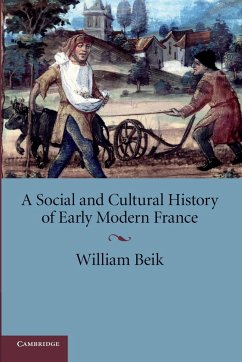A magisterial history of French society between the end of the middle ages and the Revolution by one of the world's leading authorities on early modern France. Using colorful examples and incorporating the latest scholarship, William Beik conveys the distinctiveness of early modern society and identifies the cultural practices that defined the lives of people at all levels of society. Painting a vivid picture of the realities of everyday life, he reveals how society functioned and how the different classes interacted. In addition to chapters on nobles, peasants, city people, and the court, the book sheds new light on the Catholic church, the army, popular protest, the culture of violence, gendered relations, and sociability. This is a major new work that restores the ancien régime as a key epoch in its own right and not simply as the prelude to the coming Revolution.
Hinweis: Dieser Artikel kann nur an eine deutsche Lieferadresse ausgeliefert werden.
Hinweis: Dieser Artikel kann nur an eine deutsche Lieferadresse ausgeliefert werden.
'William Beik culminates his years of scholarship with a stunning picture of the social groupings, political dynamics, beliefs and customary practices of early modern France. We look at France from its provinces and its center, we see it through the eyes of peasants, townsfolk, and nobles. We savor the difference between its village tax-payers, its enterprising tax-collectors, and its sumptuously supported king and his courtiers. Especially, Beik gives us a lucid analysis of how the whole political and social system worked, its tensions and means of equilibrium, its sources of resistance and renewal. By the end we understand both the self-congratulation of the French elite and the deep dissatisfaction that led to revolution.' Natalie Zemon Davis, University of Toronto and author of Society and Culture in Early Modern France








